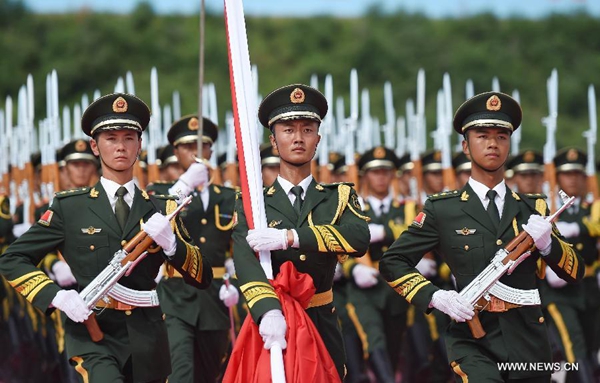Ethiopia's part in the anti-fascist alliance
- By Zekarias Woldemariam
 0 Comment(s)
0 Comment(s) Print
Print E-mail China.org.cn, September 2, 2015
E-mail China.org.cn, September 2, 2015
|
|
|
Soldiers take part in a training at a training base in Beijing, capital of China, Aug. 25, 2015. Soldiers who will escort Chinese national flag in the Sept. 3 military parade have been trained here as from June in uniforms. The military parade will be held in Beijing on Sept. 3 to mark the 70th anniversary of the victory of the Chinese People's War of Resistance Against Japanese Aggressions and the World Anti-Fascist War. [Xinhua/Chen Yehua] |
China's endeavor to organize such spectacular victory parade in Beijing is attracting world attention. Leaders of various countries will attend the event. It is a big cause that should actually bring together leaders from around the world.
The commemorative parade is a reminder for us all of the need for a renewed commitment to preventing such aggression since most of the crimes against humanity have happened due to lack of concerted efforts among countries.
Ethiopia's history is a good example. As the Japanese forces were launching persecution in China, their allies the fascist Italians were doing the same against Ethiopia.
Following their defeat at the historic Battle of Adwa in 1896, the Italians were preparing for more than four decades to reclaim their reputation and clear the embarrassment that followed. Precipitated by the imperialistic and fascist sentiment that flourished around the 1930s they campaigned to bring Ethiopia into its empire.
Italy was already colonizing Eritrea and Italian Somaliland that neighbor Ethiopia to the north and southeast respectively. Using a minor border skirmish at Walwal in the southeast as a pretext the Italians declared full scale war in early December 1934. The clash left approximately 150 Ethiopians and two Italians dead and led to the "Abyssinia Crisis" at the League of Nations.
Though the Ethiopian forces, who lagged far behind the Italians in terms of military equipment, fought hard, it was a forlorn struggle. The fascists used all the means possible to win, using internationally- forbidden weapons and chemicals.
Large number of Ethiopians lost their lives both in the fighting as well as due to indiscriminate persecution by fascist forces. Air bombing, mass shooting and beheading were among the worst atrocities that are still recounted by living witnesses who have it fresh in their memories.
Ethiopia was a member of the League of Nations at the moment. Seeing the possible menace the then ruler Emperor Haile Sellassie left the country to plead with the League for support against the aggression. However the League didn't respond. Countries like Britain and France also chose to appease Italy through neglecting Ethiopia grievances in a vain bid to prevent the Italians aligning themselves with Hitler's Germany.
After noticing the silence of League members over the annexation and aggression against his country Emperor Haile Sellassie made a notable speech "Today it is us, tomorrow it is you." The outbreak of World War II proved his words were absolutely right and a large part of the world had to pay a high price for the League's failure to act. It showed that appeasing aggressors cannot turn them into friends and rather it is necessary always to call a spade a spade.







Go to Forum >>0 Comment(s)